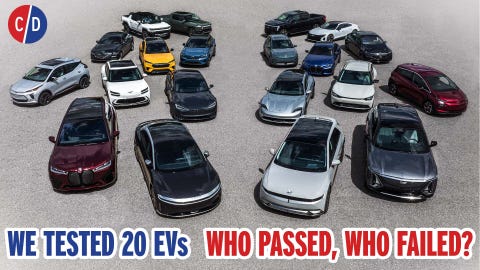
From the November 2022 issue of Car and Driver.
The Ford Eluminator concept truck ruined me. Ever since Ford announced its electric crate motor, I’ve been daydreaming about putting one (or two) in a ’90s Bronco. But then I got to drive Ford’s own 1978 F-100 retro-rod out on the street in Charlotte, and it’s so good that nothing I could create will ever compare. The Eluminator drives like a Mustang Mach-E GT Performance with a cool old truck body draped over its running gear, which is exactly what it is. It’s tight, agile, and extremely quick, and I could never hope to build anything like it. But Ford could, and definitely should, because the Eluminator is flush with an attribute that can be elusive for EVs: personality.
If you drive one particular electric vehicle all the time, you might never realize that they all drive exactly the same. When I was at our EV of the Year testing, I began to despair as I switched between the Lucid Air and the Volvo C40 Recharge and realized both drive like the Tesla Model S Plaid, which drives the same as the Rivian R1T. Sure, there are variations in suspension and steering and brakes, but pin the accelerator to the floor and what happens next will differ only in degree: smooth, rapid acceleration. I love the no-waiting blastoffs afforded by EVs, but the homogeneous behavior is a real bummer. Which means that for an EV to distinguish itself, the rest of the car better be weird. Like maybe it’s shaped like a 44-year-old regular-cab pickup, or takes the form of a BMW iX.
BMW is conducting a sort of A/B test on customers, offering traditional cars that happen to be electric (the i4) alongside avant-garde lunar modules like the iX. Give me the freakmobile. In the i4 M50, you look around the cabin, see a 3-series sedan, and then get sad when it doesn’t act like an M3. In the iX M60, your frame of reference is obliterated by crystal-finish switchgear, an electrochromic roof, and a soundtrack scored by Hans Zimmer. Even the body shape defies easy comparison—I think it’s a sneaky wagon that happens to have 811 pound-feet of torque. Lower the suspension two inches and it’s an M5 Touring from another dimension.
While BMW positions its gas-powered and electric sedans as different models, Genesis is bold enough to offer internal-combustion and EV versions of the same dang car, the G80. I drove them back to back and expected I’d prefer the EV—with 365 horsepower, it hits 60 mph in 4.1 seconds, which is 0.6 second quicker than the V-6 car. Alas, speed isn’t everything. The Electrified G80 (catchy name alert!) is hushed, refined, and effortlessly quick. But if you climb in after driving a G80 Sport with the V-6, you’re instantly reminded of the sensory involvement you’re missing: hearing the turbos spool as the torque ramps up and the transmission cracks off an upshift, accompanied by a harmonious burr from the exhaust. It’s dinosaur technology, I know. But in a car that’s otherwise conventional, the engine is the centerpiece of the experience. The Electrified G80 is a handsome cipher. It’s so shy about its EV nature, I was about five minutes from unscrewing the rear license plate to look for the charge port before I resorted to the owner’s manual and learned that a corner of the grille flips open for charging. Which begs the question: Why does an EV even have anything that looks like a grille?
When it comes to electric cars, the stranger the better. Let’s make them look like 1978 F-100s. Let’s make them look like flying saucers. Give me neon-purple underglow lighting that gets brighter when I stomp the accelerator. Put the steering wheel in the middle of a front bench seat on my six-wheel-drive convertible pickup. Let’s have a clean break to the freak side. General Motors already brought back the Hummer. But this is a job for Saab.
This content is imported from OpenWeb. You may be able to find the same content in another format, or you may be able to find more information, at their web site.
#Ezra #Dyer #EVs #Weirder
Source link






